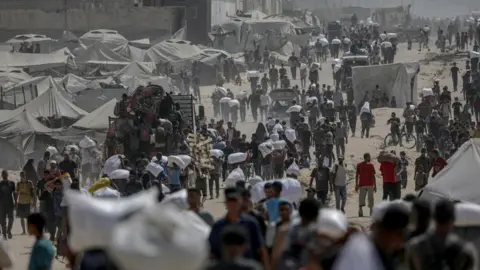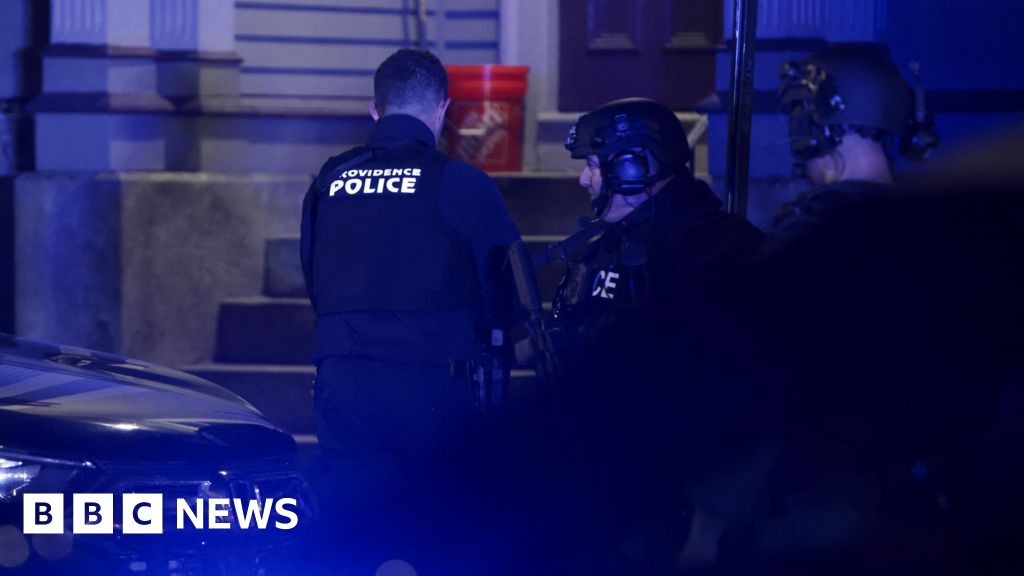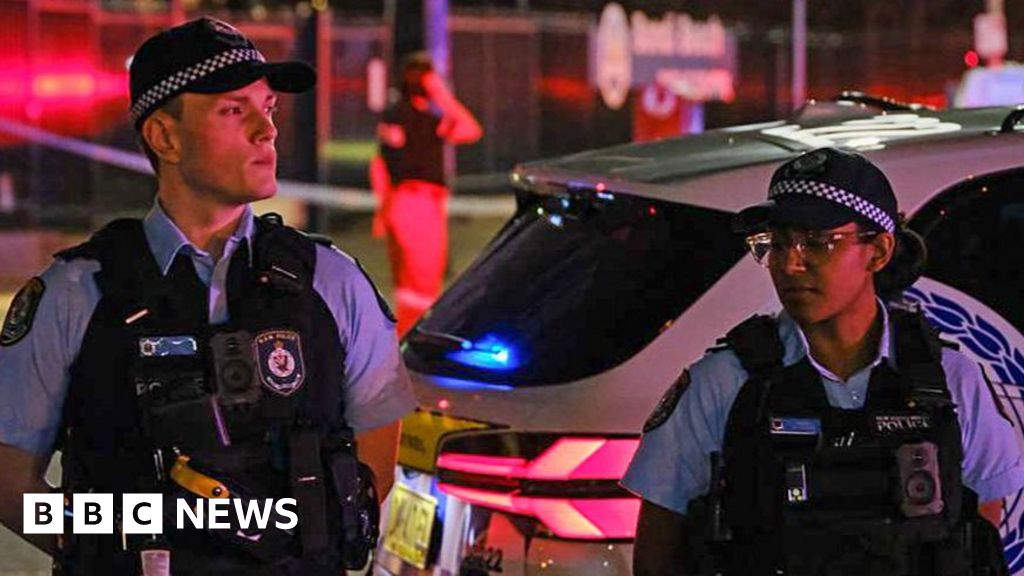Emir Nader
BBC News in Jerusalem
Cachella Smith
BBC News in London

 EPA
EPA
Gazans carry aid packages from a food distribution point in Zikim in the northern Gaza Strip
A further 11 deaths resulting from malnutrition have been reported in Gaza, according to the Hamas-run health ministry.
That brings the total number of malnutrition-related deaths to 212, including 98 children.
At least 38 people have also been killed and 491 injured as a result of Israeli military activity over the past 24 hours, the health ministry said.
Deaths continue to rise amid reports that a deadline of 7 October 2025 has been set for residents to evacuate Gaza City following the announcement of a controversial Israeli plan to take control of the area.
The new plan, approved by the Israeli security cabinet and detailed on Friday, lists five "principles" for ending the war in Gaza, with one being "taking security control of the territory".
Reports in Israeli media say the plan initially focuses on taking full control of Gaza City, relocating its estimated one million residents further south.
The plan has been met with criticism from world leaders as well as fierce opposition from some within Israel, including from military officials and the families of hostages still being held in Gaza who fear for their safety.
Israel has rejected criticism, with Defence Minister Israel Katz saying condemnation would "not weaken our resolve".
The US has been less critical - with Donald Trump saying earlier in the week that it was "pretty much up to Israel" whether to fully occupy the Gaza Strip.
Israeli media reports that the government has set a two-month deadline before a military siege of Gaza City to begin on 7 October 2025, the two-year anniversary of the beginning of the war.
Within those two months, Israel plans to forcibly displace the estimated one million Palestinians living in Gaza City, roughly half the number of people living in the entirety of the territory.
Gaza City is the capital of the Gaza Strip. Its pre-war population was estimated at around 600,000 people, but that number has grown significantly throughout the war as Israel's military campaign has pushed Palestinians into the city.
Many living there now have already been displaced multiple times through the war and are living in tents or the ruins of buildings that have been partially destroyed by Israeli air strikes.
Israeli media reports that the military would move the population towards al-Mawasi, a vast tent encampment in the south of Gaza, already home to thousands of Palestinians suffering from an absence of basic facilities and sanitation.
The plan is being widely condemned by humanitarian agencies and indeed many of Israel's allies for its potential to add untold human suffering onto the shoulders of an already exhausted and beleaguered people.
The move to take control of Gaza City will further complicate Palestinians' ability to meet their basic needs for survival, as UN-backed global food security experts say the "worst-case scenario of famine" is already playing out.
The UN's humanitarian agency said on Friday that the amount of aid entering Gaza continues to be "far below the minimum required to meet people's immense needs".
Israel has denied there is starvation in Gaza and accused UN agencies of not picking up aid at the borders and delivering it.
The UN's humanitarian agency said it continues to see impediments and delays as it tries to collect aid from Israeli-controlled border zones.
Challenges in distributing aid persist as deaths of people trying to get food continue to be reported.
Gaza's health ministry said on Saturday that 21 people had been killed trying to get aid in the last 24 hours.
The UN reported earlier this month that 1,373 Palestinians have been killed seeking food since late May, when a new US and Israeli-backed organisation Gaza Humanitarian Foundation (GHF) set up aid distribution sites.
The UN said most were killed by the Israeli military, with 859 killed near GHF sites and 514 along the routes of food convoys. The GHF denies the UN's figure.
Israel has accused Hamas of instigating chaos near the aid centres and says its forces do not intentionally open fire on civilians.
Israel does not allow the BBC and other news organisations to report independently from Gaza, making it difficult to verify.
In its announcement of the plan to conquer Gaza City, Israel's prime minister's office said it will provide "humanitarian aid to the civilian population outside the combat zones", but did not provide further information of what that might entail.
Like previous forced displacements throughout the war, the expulsion of Palestinians will likely see chaotic and dangerous scenes of families travelling by foot, by cart or by overloaded vehicles.
It has been reported that after the deadline of 7 October 2025, Israel's military will lay siege to Gaza City and escalate its attacks. Hamas has pledged to fiercely resist Israel's attempt to conquer the city.
We may also see similar scenes to what the military has done in Rafah, in Gaza's south, and in northern towns, which were forcibly evacuated before being almost totally levelled in a systematic method.
If there are Hamas fighters holding Israeli hostages in Gaza City, then this period would prove the most deadly.
It is understood that Hamas has given orders to captors to kill hostages should Israeli military troops approach close to hiding locations.
An estimated 20 Israeli hostages remain alive in Gaza, some of whom are believed to be held around Gaza City.
Israel began its military offensive in Gaza after the Hamas-led attacks on Israel on October 7 2023, in which about 1,200 people were killed and 251 others were taken hostage.
Since then, more than 61,300 people have been killed in Gaza as a result of Israeli military operations.
.png)
 4 months ago
28
4 months ago
28








 English (US) ·
English (US) ·